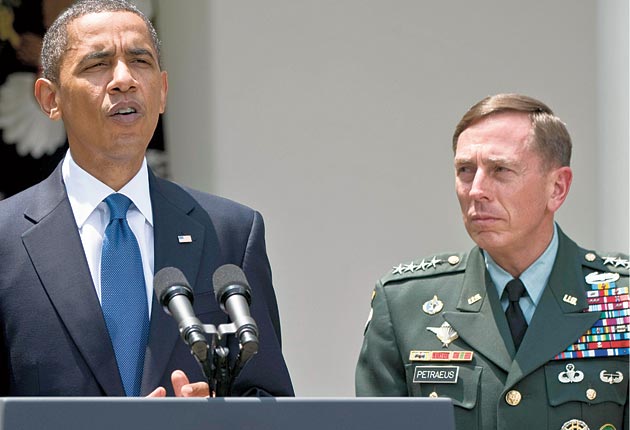Republicans exploit sacking to challenge Afghan strategy
McCain leads assault on Obama's decision to reveal exit strategy from warzone

Your support helps us to tell the story
From reproductive rights to climate change to Big Tech, The Independent is on the ground when the story is developing. Whether it's investigating the financials of Elon Musk's pro-Trump PAC or producing our latest documentary, 'The A Word', which shines a light on the American women fighting for reproductive rights, we know how important it is to parse out the facts from the messaging.
At such a critical moment in US history, we need reporters on the ground. Your donation allows us to keep sending journalists to speak to both sides of the story.
The Independent is trusted by Americans across the entire political spectrum. And unlike many other quality news outlets, we choose not to lock Americans out of our reporting and analysis with paywalls. We believe quality journalism should be available to everyone, paid for by those who can afford it.
Your support makes all the difference.The revolving door spectacle at the top of America's military brass may have been executed with swift efficiency by Barack Obama but the fallout may just be beginning as Republicans prepare again to challenge his plans to begin a troop withdrawal from Afghanistan next year.
Fresh and possibly unfriendly scrutiny of President Obama's war strategy will come as the Senate Armed Services Committee prepares to hold hearings to confirm the appointment of General David Petraeus to replace General Stanley McChrystal who was given his marching orders on Wednesday.
That General Petraeus will sail through the hearings is not in question. With luck he will have been confirmed by the end of next week allowing him to travel to Afghanistan quickly thereafter. The risk for the White House, however, is that the hearings become a forum for grievances and second-guesses about a war strategy that from all perspectives does not seem to be meeting its goals.
It is Mr Obama's pledge to start winding down America's military commitment in July next year, made alongside his decision last year to approve the current surge, that will get most attention. The assaults began yesterday with Senator John McCain taking the lead.
"It's completely understandable why the President made the decision that he did, based on the civilian-military relationship that goes a long way back," he said. But on the issue of the withdrawal deadline, he added: "You cannot tell your enemy when you're leaving in warfare and expect your strategy to prevail. That's just a fundamental of warfare."
Until this week, the war in Afghanistan had faded from daily political discussion in Washington, in part because of the BP oil spill. But the McChrystal crisis has put it back stage centre, and not at a propitious time for the President whose approval rating, according to a new NBC-Wall Street Journal poll has dipped to 45 per cent, his worst score ever.
General Petraeus, who is taking a step down from his current job as head of central command to take over in Afghanistan, was intimately involved in crafting his predecessor's counter-insurgency approach on the ground, which stresses protecting civilians, restricting where possible the use of lethal force and trying to lure young Taliban fighters away from their cause.
He now becomes the new owner of that approach and his – which for now remains in the walk-on-water territory as far as Congress is concerned – is thus on the line. There are few who believe it is working very well, not least because President Hamid Karzai is still not governing in the way Americans would like.
While turning to General Petraeus earned him quick applause, Mr Obama may have created new problems for himself. For one, Petraeus will own him like no other general, because barring some truly egregious mis-step he is at this point unsackable. More important are the doubts that he may have about the President's calendar for withdrawal, which he seemed almost to verbalise while giving testimony to the Armed Services Committee last week.
In phrases that seemed to threaten the White House position, General Petraeus told the senators: "We have to be very careful with timelines." He observed that a July 2011 deadline for a troop withdrawal would depend on the "conditions" being favourable.
If there is a split here it is a dangerous one for Mr Obama, who since taking office has tripled American troop numbers in Afghanistan but has softened the backlash from the left of his party with the promise to begin drawing down those numbers in July next year.
But little of what Mr Obama has promised is happening, including the notion that the allies would deploy 10,000 troops to Afghanistan to help boost numbers. Indeed, Mr McCain will argue next week that it is because the US is talking withdrawal that countries including Poland and Canada have found it easier to announce their own exit plans.
There were also signs that allies might use the American leadership debacle to question broader strategy, notably from Poland where a top military official last night described the situation in Afghanistan as getting "systematically worse". The White House was hoping that Mr Obama may yet win some renewed political traction because of the decisiveness he showed dispatching General McChrystal.
Join our commenting forum
Join thought-provoking conversations, follow other Independent readers and see their replies
Comments